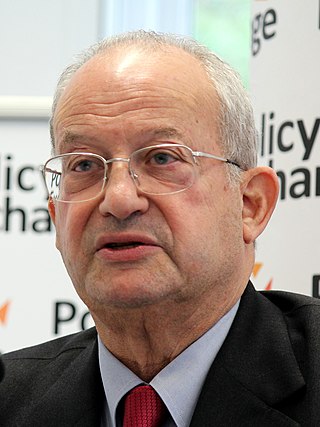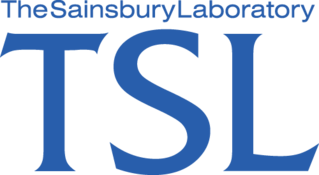Related Research Articles

David John Sainsbury, Baron Sainsbury of Turville is a British politician, businessman and philanthropist. From 1992 to 1997, he served as chairman of Sainsbury's, the supermarket chain established by his great-grandfather John James Sainsbury in 1869.

The Wellcome Trust is a charitable foundation focused on health research based in London, United Kingdom. It was established in 1936 with legacies from the pharmaceutical magnate Henry Wellcome to fund research to improve human and animal health. The aim of the Trust is to "support science to solve the urgent health challenges facing everyone." It had a financial endowment of £29.1 billion in 2020, making it the fourth wealthiest charitable foundation in the world. In 2012, the Wellcome Trust was described by the Financial Times as the United Kingdom's largest provider of non-governmental funding for scientific research, and one of the largest providers in the world. According to their annual report, the Wellcome Trust spent GBP £1.1 billion on charitable activities across their 2019/2020 financial year. According to the OECD, the Wellcome Trust's financing for 2019 development increased by 22% to US$327 million.

The Institute of Psychiatry, Psychology & Neuroscience (IoPPN) is a centre for mental health and neuroscience research, education and training in Europe. It is dedicated to understanding, preventing and treating mental illness, neurological conditions, and other conditions that affect the brain. The IoPPN is a faculty of King's College London, England, and was previously known as the Institute of Psychiatry (IoP).
Neuroinformatics is the emergent field that combines informatics and neuroscience. Neuroinformatics is related with neuroscience data and information processing by artificial neural networks. There are three main directions where neuroinformatics has to be applied:

The Cambridge Biomedical Campus is the largest centre of medical research and health science in Europe. The site is located at the southern end of Hills Road in Cambridge, England.
Ritchie Studio, formerly known as Ian Ritchie Architects, is a British architectural and design practice, based in London led by its founder Ian Ritchie. Recently completed projects include the RIBA Award-winning Susie Sainsbury Theatre, the Angela Burgess Recital Hall for the Royal Academy of Music, and the Sainsbury Wellcome Centre for Neural Circuits and Behaviour, University College London.

The Sainsbury Laboratory (TSL) is a research institute located at the Norwich Research Park in Norwich, Norfolk, England, that carries out fundamental biological research and technology development on aspects of plant disease, plant disease resistance and microbial symbiosis in plants. The Sainsbury Laboratory partners with the John Innes Centre on a Plant Health Institute Strategic Program (ISP) funded by the Biotechnology and Biological Sciences Research Council (BBSRC).

The Centre for Mental Health is an independent mental health charity in the United Kingdom. It aims to inspire hope, opportunity and a fair chance in life for people of all ages with or at risk of mental ill health. The centre acts as a bridge between the worlds of research, policy and service provision and believes strongly in the importance of high-quality evidence and analysis. It encourages innovation and advocates for change in policy and practice through focused research, development and training.
The School of Biological Sciences is a research-led academic community at the University of East Anglia. It works with partners in industry on a range of activities, including translating research discoveries into products, making knowledge and research expertise available through consultancies, contract research and provision of analytical services, as well as partnering industry in training both undergraduate and postgraduate students.
The UCL Faculty of Life Sciences is one of the 11 constituent faculties of University College London (UCL).

The UCL Queen Square Institute of Neurology is an institute within the Faculty of Brain Sciences of University College London (UCL) and is located in London, United Kingdom. Together with the National Hospital for Neurology and Neurosurgery, an adjacent facility with which it cooperates closely, the institute forms a major centre for teaching, training and research in neurology and allied clinical and basic neurosciences.

The Wolfson Institute for Biomedical Research at UCL is an academic department of the Faculty of Biomedical Sciences of University College London located in London, United Kingdom. The Institute is situated in the Cruciform Building, formerly the main building of University College Hospital, in the Bloomsbury district of Central London.

John O'Keefe is an American-British neuroscientist, psychologist and a professor at University College London.

The UCL Division of Psychology and Language Sciences is a Division within the Faculty of Brain Sciences of University College London (UCL) and is located in London, United Kingdom. The Division offers teaching and training and undertakes research in psychology and communication and allied clinical and basic science. It is the largest university psychology department in England.
The Sainsbury Wellcome Centre (SWC) is a neuroscience research institute located in London, United Kingdom. The SWC is part of University College London (UCL), but sits outside of the faculty structure. It is funded by the Gatsby Charitable Foundation and Wellcome.

Robin Angus Silver is an English neuroscientist who is professor of neuroscience and a Wellcome Trust Principal Research Fellow at University College London. His laboratory studies neurotransmission and artificial neural networks by combining in vitro and in vivo experimental approaches with quantitative analysis and computational models developed in silico.

Dora Angelaki is a Professor of Neuroscience in the New York University Tandon School of Engineering. She previously held the Wilhelmina Robertson Professorship of Neuroscience at the Baylor College of Medicine. She looks at multi-sensory information flow between subcortical and cortical areas of the brain. Her research interests include spatial navigation and decision-making circuits. She was elected to the National Academy of Sciences in 2014.
Tim P. Vogels is a professor of theoretical neuroscience and research leader at the Institute of Science and Technology Austria. He is primarily known for his scholarly contributions to the study of neuronal plasticity related to learning and memory in the brain.
Sonja Hofer is a German neuroscientist studying the neural basis of sensory perception and sensory-guided decision-making at the Sainsbury Wellcome Centre for Neural Circuits and Behaviour. Her research focuses on how the brain processes visual information, how neural networks are shaped by experience and learning, and how they integrate visual signals with other information in order to interpret the outside world and guide behaviour. She received her undergraduate degree from the Technical University of Munich, her PhD at the Max Planck Institute of Neurobiology in Martinsried, Germany, and completed a post doctorate at the University College London. After holding an Assistant Professorship at the Biozentrum University of Basel in Switzerland for five years, she now is a group leader and Professor at the Sainsbury Wellcome Centre for Neural Circuits and Behaviour since 2018.

Tom Mrsic-Flogel is an experimental neuroscientist. He is Director of the Sainsbury Wellcome Centre and a Professor in Neuroscience at University College London (UCL). Mrsic-Flogel is a founding member of the International Brain Laboratory.
References
- ↑ "Gatsby Charitable Foundation | Development Co-operation Profiles – Gatsby Charitable Foundation | OECD iLibrary". 16 June 2024.
- ↑ "Gatsby Computational Neuroscience Unit". Gatsby.ucl.ac.uk. Retrieved 2012-10-17.
- ↑ "Sainsbury Wellcome Centre for Neural Circuits and Behaviour | Neuroscience | Gatsby". www.gatsby.org.uk. Retrieved 2022-01-31.
- ↑ "University Technical Colleges". Utcolleges.org. 2012-10-09. Archived from the original on 2012-06-19. Retrieved 2012-10-17.